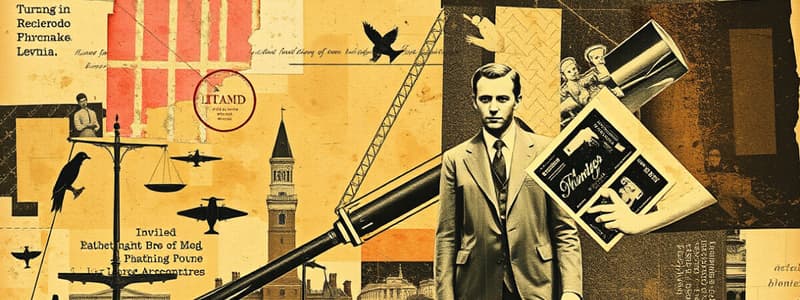Podcast
Questions and Answers
What is a tort?
What is a tort?
- A type of contract
- A criminal offense
- Private or civil wrong that the law grants a remedy for (correct)
- An invitation to negotiate
What are damages in a legal context?
What are damages in a legal context?
- Punitive measures imposed by the law
- Monetary awards for loss or injury (correct)
- Legal documents filed in court
- Types of civil rights
What does the master-serving rule entail?
What does the master-serving rule entail?
It holds the master (employer) liable for the conduct of the servant (employee).
What is negligence?
What is negligence?
What is respondeat superior?
What is respondeat superior?
What are intentional torts?
What are intentional torts?
What is assault?
What is assault?
What is battery?
What is battery?
What constitutes false imprisonment?
What constitutes false imprisonment?
What is defamation?
What is defamation?
What is invasion of privacy?
What is invasion of privacy?
What is trespass to land?
What is trespass to land?
What is conversion?
What is conversion?
What is fraud?
What is fraud?
What is strict liability?
What is strict liability?
What are statutes of repose?
What are statutes of repose?
What is an injunction?
What is an injunction?
What are compensatory damages?
What are compensatory damages?
What are punitive damages?
What are punitive damages?
Who is a plaintiff?
Who is a plaintiff?
What is a summons?
What is a summons?
What is an answer in legal terms?
What is an answer in legal terms?
What is discovery in a civil lawsuit?
What is discovery in a civil lawsuit?
What is evidence in a legal context?
What is evidence in a legal context?
What is testimony?
What is testimony?
What is a witness?
What is a witness?
What is a verdict?
What is a verdict?
What is a judgement?
What is a judgement?
What is a complaint in legal terms?
What is a complaint in legal terms?
Flashcards are hidden until you start studying
Study Notes
Key Legal Terms in Business Law
-
Tort: A private or civil wrong recognized by the law, providing a remedy to the injured party.
-
Damages: A monetary award from the court to compensate a victim for loss or injury caused by another's actions.
-
Master-Servant Rule: Establishes that an employer (master) is liable for the actions of their employee (servant) during the course of employment.
-
Negligence: A prevalent tort, resulting from careless actions that lead to harm or injury to another person.
-
Respondeat Superior: A legal doctrine holding employers liable for the actions of their employees performed within the scope of employment.
Types of Torts
-
Intentional Torts: Torts committed purposely by the defendant, with the intent to cause an injury.
-
Assault: An intentional act that creates a fear of imminent harmful or offensive contact in another person.
-
Battery: Involves harmful or offensive physical touching of another individual.
-
False Imprisonment: The unlawful deprivation of an individual's freedom of movement without consent or legal privilege.
-
Defamation: The act of making false statements that harm an individual's reputation.
-
Invasion of Privacy: Unauthorized intrusion into someone’s personal life, causing mental distress or humiliation.
-
Trespass to Land: Entering someone else's property without permission.
-
Conversion: Wrongfully using or controlling someone else's property, depriving the owner of its use.
-
Fraud: The intentional deception regarding a significant fact, leading another party to act in a way that causes harm.
-
Strict Liability: A legal doctrine holding a party responsible for damages without needing to prove negligence or fault.
Legal Procedures and Terms
-
Statute of Repose: A law that limits the time frame in which a lawsuit can be filed for defects in a product's design or manufacturing, typically ranging from 10 to 12 years.
-
Injunction: A court-issued directive requiring a party to perform or refrain from a specific action.
-
Compensatory Damages: Financial awards designed to restore an injured party to their prior condition before the loss or injury occurred.
-
Punitive Damages: Monetary penalties imposed on a defendant to punish wrongful conduct and deter future misconduct.
-
Plaintiff: The party initiating a civil lawsuit by filing a complaint against another party.
-
Summons: A court order commanding a defendant to appear in court to respond to a complaint.
-
Answer: A legal document where the defendant addresses the allegations made in the complaint.
-
Discovery: A pre-trial process wherein parties gather information and evidence to build their cases.
Evidence and Court Process
-
Evidence: Materials or information presented in court to prove or refute allegations.
-
Testimony: Statements made by witnesses under oath during legal proceedings.
-
Witness: An individual who possesses relevant knowledge about the facts of the case.
-
Verdict: The decision reached by a jury regarding the outcome of a case.
-
Judgment: The final ruling or decision issued by a court following a trial.
-
Complaint: A formal legal document filed by the plaintiff outlining allegations against the defendant and requesting relief, typically in the form of damages or an injunction.
Studying That Suits You
Use AI to generate personalized quizzes and flashcards to suit your learning preferences.




